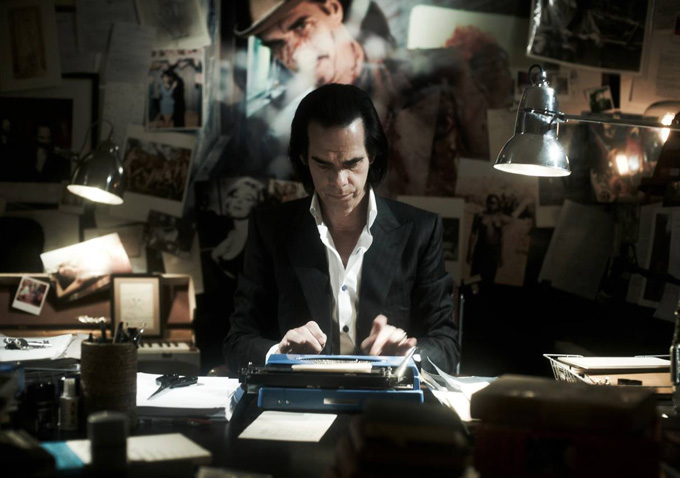
Though he’s never been a superstar, after four decades of making music there is no question that Nick Cave is a legend. Singer, songwriter and occasional composer, Cave has been playing in bands since he was in his teens, from his post-punk group The Birthday Party, to his back-to-basics side project Grinderman, to his solo work and his band for over 30 years, The Bad Seeds. Though his music has only ever crossed over into the mainstream a few times (the soundtrack staple “Red Right Hand” and Kylie Minogue duet “Where The Wild Roses Grow”), he has nevertheless amassed an army of dedicated fans all over the world. The new documentary “20,000 Days On Earth” is neither the career retrospective or concert film you might expect, but rather a snapshot of the musician, now 57, still trying to connect with his muse.
Far from your ordinary music doc, the film is loosely set in a fictional 24 hours in Cave’s life as he examines his own songwriting process and transforms his music from an unformed sketch to a live show scorcher. It also features hallucinatory interviews and staged sequences with voiceover provided by Cave. Unusual as it may be, it’s the only approach that suits an artist as unique as this one. Though he is known for mythologizing the characters in his songs, there are no attempts made to build his own legend here. There’s a difference between the character Cave plays on stage and in his songwriting and the one we see here in the film who is candid, confessional and though immensely talented, at times rather ordinary. In describing his writing process, he likens himself to a cannibal, chewing up experiences and spitting them out as songs.
Initially, it’s unclear if the music Cave is working on is something brand new but eventually you can hear the musical sketches morphing into the songs from Push The Sky Away, his magnificently moody album from last year. Along the way we get glimpses into his friendship with longtime collaborator Warren Ellis who we see building loops for Cave to riff lyrics over. Ellis points out that Cave may have accidentally nicked the melody to Lionel Ritchie’s “All Night Long” and Cave responds by improvising lyrics about his morning coffee (“1 shot latte”). At one point Ellis confesses to his friend, “I’ve probably had more meals with you than with my wife” as the pair discuss transformative concerts they’ve attended throughout their lives.
There are also a few cameos from Nick’s friends—Ray Winstone (who starred in the video for “Jubilee Street”), Kylie Minogue and Blixa Bargeld (longtime guitarist for the Bad Seeds) explaining why he left the group in 2003 after 20 years with the band—who appear as hallucinations in the passenger seat of his car, rather than through a standard interview segment. Cave’s own perspective is provided through poetic narration and interview segments which are filmed like visits to the therapists office. Here he speaks openly about everything from his early sexual experiences, to his father who died when he was still young. But mostly he focuses on songwriting, how he still loves to perform, and he discusses the delicate balance between performer and audience where one yawn can ruin the whole illusion.
Though the film steers clear of biography, it does allow for a few brief trips down memory lane in the form of a pair of sound-and-fury montages that bookend the film and a trip to the archive in Australia, which houses photos and artifacts from throughout Cave’s career. The singer laughs at finding his old Will & Testament where he deemed all his assets to be left to the “Nick Cave Memorial Museum” and admits he was an ostentatious bastard in his youth. If there is any issue to be taken with the film, it’s that it only seems to skim the surface. One gets the impression that had they been allowed, the filmmakers would’ve done an even deeper dive into Cave’s psyche. But even at a scant 90 minutes, the film manages to cover a lot of ground, hopping around from interviews to live footage, the highlights of which are a live studio take of “Higgs Bossom Blues,” a 9 minute epic whose slithering slow build plays out uninterrupted and the finale, a blistering live performance of “Jubilee Street” featuring a string section and children’s choir, intercut with scenes of Cave onstage over the years.
Cave is credited as a co-writer on the film along with directors Iain Forsyth and Jane Pollard, visual artists who have been making videos with him for nearly a decade. According to the co-directors it was a true collaboration with Cave offering input to help shape the film (“we might need something about memory here”) and while many docs will try to conceal restaging certain sequences, here the filmmakers embrace the artifice and these sequences are presented more like a traditional narrative film, allowing for beautiful cinematography by Erik Wilson (“Submarine,” “The Imposter”). Forsyth and Pollard also have fun with the film, embedding in-jokes like Cave’s pal Kylie Minogue’s song “Can’t Get You Out Of My Head” coming on the radio before he quickly switches it off. While the doc should prove essential for Nick Cave fans, it should be inspiring for those interested in the creative process or anyone searching for their muse. [B+]
Browse through all our coverage of the 2014 Sundance Film Festival by clicking here.

